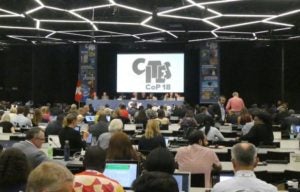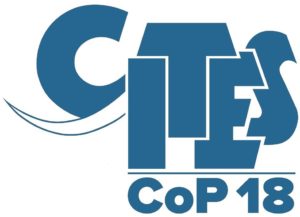
This release has been corrected.
GENEVA—One hundred and thirty-five* wild animal species received protections against unsustainable international trade at the 18th Conference of the Parties to the Convention on International Trade in Endangered Species (CITES) that concluded today in Geneva. Most species received protection for the first time while some received increased protection. Nations gathered as the world looks on in horror at images of Brazil’s Amazon rainforest in flames, and dire warnings earlier this year of an extinction crisis still fresh in delegates’ minds.
Teresa Telecky, vice president for wildlife at global animal protection charity Humane Society International, said from the CoP in Geneva: “With the backdrop of forest fires burning in the Amazon, it was heartening to see governments at CITES agree to vital extra protections for 135 species of wild animal, including mako sharks who fall victim to the fin trade, giraffes killed and sold for trophies, baby African elephants ripped from their families for foreign zoos, and geckos and lizards stolen from the wilderness for the pet trade. Realising that our planet’s wildlife face ever increasing threats in all corners of the globe, the mood of this conference has felt more in favour of protection from the pressures of commercial exploitation, rejecting arguments for reckless trade in animals and their body parts.”
In May, a report by the Intergovernmental Science-Policy Platform on Biodiversity and Ecosystem Services warned that 1 million of the world’s estimated 8 million species are threatened with extinction, that the rate of species extinction is accelerating, that direct exploitation is one of the main culprits, and that unsustainable food production is destroying wildlife ecosystems.
Jeffrey Flocken, president of Humane Society International, said: “The world is waking up to the reality that we are at a turning point for saving our planet’s wildlife. Thankfully, the countries of the planet seem to be shifting their focus from exploiting animals to protecting them.”
Quotes from HSI experts on species voted on at CITES
Ivory trade
Iris Ho, senior wildlife specialist at Humane Society International, said: “It was a relief that the status quo for ivory was maintained. While Humane Society International would have preferred CITES to have supported the plea from the African Elephant Coalition for all elephant populations to be listed on Appendix I to send an unambiguously clear signal that the international community has zero tolerance for the ivory, we are pleased that proposals to trade elephant and rhino ivory submitted to this conference were rejected.”
Live trade in African elephants
Audrey Delsink, wildlife director for Humane Society International/Africa said: “Humane Society International was jubilant that CITES agreed to end the heinous trade in live baby elephants. No young elephant should ever suffer the trauma of being stolen from its mother for a lonely miserable life in captivity overseas. We thank all of the celebrities and supporters who joined the campaign to win this historic vote.”
Giraffes
Adam Peyman, programs and operations manager for wildlife at Humane Society International, said: “Giraffes have been quietly slipping toward extinction, in part due to poaching for international trade in their parts. Thankfully, the CITES Parties agreed to protect giraffe for the first time. Trade control measures will help to ensure that giraffe parts are legally acquired and not detrimental to the survival of the species.”
Sharks and rays
Rebecca Regnery, senior director for wildlife at Humane Society International, said: “Species in the shark and ray family will now get more help to withstand the voracious demand from the global trade in their fins. CITES agreed to list long and short fin mako sharks and species of giant guitarfish and wedgefish in Appendix II for trade to be regulated. This will put pressure on fisheries managers to stop the brutal practice of shark finning.”
Otters
Mark Simmonds, senior marine expert at Humane Society International, said: “We are very pleased to see two Asian otter species gain the protection of listing on CITES Appendix I. Both the small-clawed otter and the smooth-coated otter are being driven to extinction by a number of factors, including an explosion of interest in keeping them as pets in Japan and elsewhere. An end to their commercial international trade is now in sight.”
Reptiles and amphibians
Sumanth Bindumadhav, wildlife campaign manager for Humane Society International/India, said: “The pet trade will now face more controls on its voracious appetite for the world’s spectacular and unique reptiles. A suite of lizard species from Sri Lanka were listed in Appendix I, along with the tiny gecko endemic to St Vincent and the Grenadines. Four gecko species from China and South East Asia (Tokay, Tiger, Cave and Leopard) and another from Madagascar were listed in Appendix II. Sadly, proposals to end the trade in stunning garden lizards from Sri Lanka faced opposition from the EU and failed to gain protections despite being endangered and regularly on sale in Europe and the USA.”
Grettel Delgadillo, deputy director of Humane Society International/Latin America, said: “It was deeply frustrating that European voting bloc thwarted protection for 104 species of glass frog from Amazon rainforests. This was especially galling when only modest trade controls were requested by South and Central American countries, and when it is EU citizens who are the major customers of the tiny frogs for exotic pet collections. It was regrettably clear at the conference that the powerful pet lobby still holds much sway over the 28 nation bloc.”
Indian star tortoises
Sumanth Bindumadhav, wildlife campaign manager for Humane Society International/India, said: “The Indian star tortoise is a victim of the international pet trade that sees them illegally caught in the wild and sold in markets across the world. We are much relieved that the threat they face has been recognized by CITES Parties, and that their protection status has been increased as a result. A commercial trade ban on this species under CITES can now be a vital defence against ruthless exotic pet traders who are decimating this tortoise populations for the selfish benefit of collectors in Europe and Asia.”
Trophy hunting quotas
CITES Parties agreed to tighten oversight of export quotas for species listed on CITES Appendix I including leopard, cheetah, markhor and black rhino. The quotas will be subject to a review at least every nine years (or sooner if determined necessary) to ensure that the population of the species in the range state concerned can sustain the agreed quota. HSI is disappointed that South Africa was granted an increase to its quota for exporting rhino trophies from five to nine.
Teresa Telecky, vice president for wildlife at Humane Society International, said, “For far too long, the Conference of the Parties to CITES has set quotas for export of Appendix I species and then left them in place despite the deteriorating conservation status of the species concerned. While HSI strongly opposes trophy hunting, this time-bound review process is an overdue acknowledgment by the CITES Parties that export quotas for Appendix I species must be routinely reviewed and subject to scientific scrutiny.”
ENDS
MEDIA CONTACTS:
- At CITES: Brianna Grant, bgrant@hsi.org, +1-202-360-3532
- United Kingdom: Wendy Higgins, whiggins@hsi.org, +44 (0)7989 972 423
- United States: Nancy Hwa, 202-596-0808 (cell), nhwa@hsi.org
- Australia: Ben Vozzo, +61 450 258 057, ben@hsi.org.au

